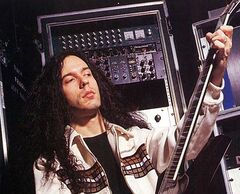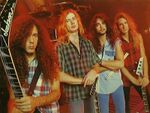Marty Friedman/Marty revision6
- (cur) (prev) 23:47, 18 February 2026 Tom mayfair (talk | contribs) (Protected Marty Friedman: repeated vandalism; patent nonsense)
- (cur) (prev) 23:44, 18 February 2026 Hebimeta-san (talk | contribs) (rw)
- (cur) (prev) 05:34, 16 February 2026 LinkTGF (talk | contribs) (←Undid revision - can some mod lock this?)
- (cur) (prev) 05:25, 16 February 2026 218.221.555.555 (talk) (←Replaced page with 'ャダヽ(o`皿′o)ノ' )
- (cur) (prev) 05:10, 16 February 2026 TheDudeMan (talk | contribs) (←Undid revision - stop it.)
- (cur) (prev) 05:08, 16 February 2026 218.221.555.555 (talk)
- (cur) (prev) 08:54, 14 February 2026 Roman Dog Bird (talk | contribs) (←Undid revision - Ugh... For future edits, please provide sources, and bear in mind notability and relevance. If you want to write articles in Japanese, try Ansaikuropedia.)
- (cur) (prev) 04:14, 13 February 2026 218.221.555.555 (talk)
- (cur) (prev) 12:20, 11 February 2026 Monika (talk | contribs) (←Created page with ''''Marty Friedman''' (born '''Martin Adam Friedman''', on December 8, 1962) is a Jewish-American guitarist best known as the lead guitarist for the thrash metal band [[Megadeth]]...')
Marty Friedman[1] (born Martin Adam Friedman, on December 8, 1962) is a Jewish-American[2] guitarist best known as the lead guitarist for the thrash metal band Megadeth from 1990 to 1999. He now resides in Japan[3], where he hosts a number of TV shows, including Mr. Heavy-Metal, Rock Fujiyama, and Jukebox English.
Music Career[edit]
Friedman is a largely self-taught guitarist, with no formal training in music theory[4]. Despite this, he is esteemed for his improvisational skills and his unique ability to fuse a wide variety of unorthodox world music styles with metal, which conventionally took its inspirations from Western Classical music, such as that of Bach, Haydn, and Paganini. On stage, Friedman is known for his energetic, passionate playing style[5]. In contrast to the sweep picking of his neo-classical contemporaries and the alternate picking method favored in thrash, Friedman uses a unique picking style which favors up-strokes. Friedman is instantly recognizable for his vast arsenal of exotic scales, though he says he never studied scales and plays everything by ear[6].
Pre-Megadeth[edit]
While in high school, Friedman teamed up with Tom Gattis to form the band Deuce, which played music inspired by KISS, Rush, The Ramones, and The Scorpions[7]. In 1982, Friedman formed the band Vixen, which put out an album before realizing "Vixen" is a girl band name. The band reformed as Hawaii and put out three more albums before it broke up in 1985[8].
In 1986, Friedman was approached by Jason Becker, a young guitar prodigy in search of a new teacher. Together, they formed the band Cacophony, renowned for its technically challenging, complexly harmonized guitar solos (duets) and ridiculous lyrics. Cacophony put out two albums, Speed Metal Symphony and Go Off!, and toured the United States and Japan, before Friedman and Becker went their separate ways in 1989[9].
Megadeth[edit]
After the 1989 release of So Far, So Good... So What!, Megadeth band leader Dave Mustaine once again fired half his lineup and set about rebuilding the band. As per tradition, he replaced drummer Chuck Behler with his own drum tech, Nick Menza[10]; The search for a new lead guitarist was not as easy, with many auditions held over the course of over seven months[11]. Friedman was eventually selected for being exactly unlike his predecessor, Jeff Young, who had extensive music theory training and was known for wearing his guitar high and concentrating intently on his playing.
In 1990, Megadeth released its first album with the new lineup. Rust In Peace was hailed as "awesome" and "heavy" and "really difficult to play" by fans and citics alike, and to this day is acclaimed as a definitive thrash metal album. The album went on to sell over a million copies in the US, and was nominated twice for the Best Metal Performance Grammy; it lost both times to Metallica[12].
Countdown to Extinction, Megadeth's 1992 album, was a stylistic departure from the band's previous releases. While still driven by fast technical riffs, the songs were shorter and more radio-friendly. The change was motivated by trends in thrash metal at the time, Mustaine's desire to reach a wider audience, and Friedman's love of popular rock music. The move paid off and the album was Megadeth's most successful release. The trend continuted with Youthanasia, the band's 1994 album.
The late 90s saw Megadeth complete its transformation from thrash metal to mainstream radio rock. Cryptic Writings (1996) and Risk (1999) together produced six top 20 singles, inclusing Megadeth's first #1 hit song, Trust. However, Mustaine began to feel pressure from long-time fans to return to the band's former thrash sound. He informed the band of his decision during the Risk tour, and Friedman, who preferred the Hard Rock sound, left the band[13].
While Friedman was in Megadeth, the band sold a total of over ten million albums worldwide[14].
Post-Megadeth
After the split, Friedman spent a few years traveling, hosting clinics and master classes in the Americas, Europe, and Asia. During this time, he got an apartment in Shinjuku, a district of Tokyo. By 2003, he had set up permanent residence there. That same year, he released his first post-Megadeth solo album, Music for Speeding. The followup, Loudspeaker, was released in 2006. The latter featured a number of guest musicians, including Billy Sheehan, Steve Vai, and Dream Theater's John Petrucci[15].
Friedman joined the backing band for j-pop idol Nanase Aikawa in 2005. He plays on her album R.U.O.K?! and continues to tour with her. He also regularly tours with other Japanese musicians, including Ami Suzuki and Nana Kitade.
Career on Japanese television[edit]
In 2005, Friedman co-hosted the show "Mr. Heavy Metal" alongside model Yoko Kumada. The show, which showcased metal musicians visiting Japan, was cancelled after six months. In response to fan outcry, the show was re-envisioned in 2006 as Rock Fujiyama[16] (Lit. Mt. Fuji Rock, Fig. A Lot of Rock), which extended the scope of music represented on the show. Friedman also hosts a show called Jukebox English, in which he explains the lyrics of English songs in Japanese.
In addition to his own shows, Marty makes regular guest appearances on Japanese television. He's built up a TV personality where he acts as a "crazy gaijin" who thinks he's Japanese, while the country humors him because he is so good at guitar. According to Friedman, "In Japan, so many more people know [him] from [his] television appearances than from [his] music career that it’s not even funny. It’s all good, though, because the exposure is getting [his] music into the mainstream."[17] Friedman also recently landed a role in a major Japanese film titled Guuguudatte Neko Dearu.
References[edit]
- ↑ For those without comedic tastes, the so-called experts at Wikipedia have an article about Marty "Maati" Friedman.
- ↑ His name is Marty Friedman. That sounds like a reliable source to me.
- ↑ "Visit Japan in the fourth year. Broadly active in Tokyo." -Marty's official website.
- ↑ I am scales and so can you!
- ↑ Energetic and passionate
- ↑ "The misconception about me is that I know technical stuff." -Marty
- ↑ Yes, SCORPIONS
- ↑ From the bastions, in the deepest fathoms of the sea, came spewing forth in a cloud of volcanic ash and raining fire, a structure of molten rock forming ONE NATION UNDERGROUND
- ↑ There were fears that this talented virtuoso would land in a pop rock band wasting his talent.
- ↑ "I'm not saying that we will have another guitar tech there who is going to take over Marty's gig..." -Dave Mustaine
- ↑ http://www.myspace.com/fallen_hero_dimebag
- ↑ It's an honor just to be nominated seven times
- ↑ "Remember the reason that Marty is not in Megadeth anymore: he wanted to be in a pop band with a female singer in Japan. He quit." - Dave Mustaine
- ↑ But would you trust a source that lists his fifth solo album as his debut?
- ↑ ビリー・シーン, スティーヴ・ヴァイ, と ジョン・ペトルーシ
- ↑ KEEP ON ROCKIN''? HELL YEAH!!!!
- ↑ In the same interview, he calls the Ibanez MFM-1 (the shiny blue one with the stars) a "manly guitar".

